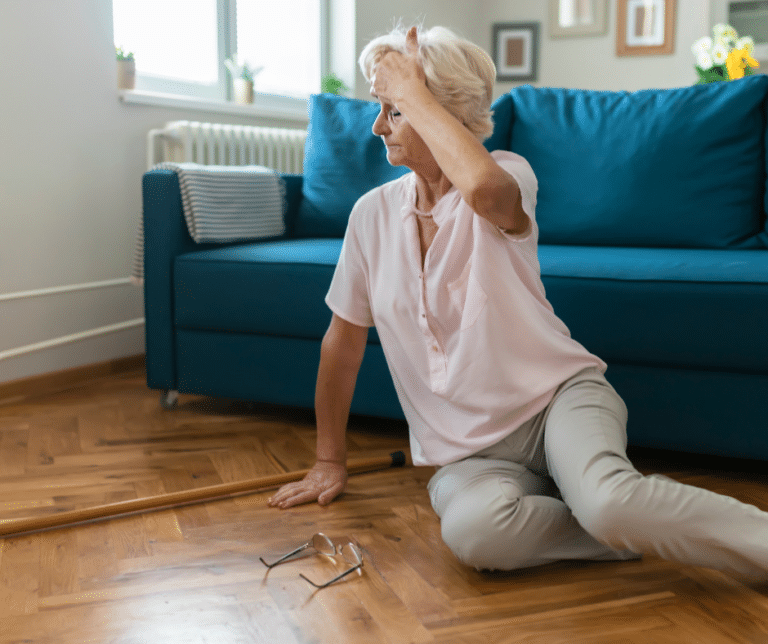Falling becomes a greater risk for all elderly people. Because of a reduction in reaction time, and often a lack of stamina or strength, many elderly people are more likely to fall in their homes. With bone loss and other health conditions, the injuries from such falls are often much more serious than when a younger person falls and could land them in the hospital for an extended recovery time. If you have an elderly loved one who has Alzheimer’s disease, she might have an increased risk of falling due to the symptoms of the disease.
Falling is more likely for those with Alzheimer’s
While physical health reasons are the most common reasons for many elderly who fall, those with Alzheimer’s disease often have cognitive issues that can contribute to the risk of falling as well. An Alzheimer’s patient may easily become confused about where they are and in that confusion, not be aware of their surroundings or any possible tripping hazards. Cognitive decline can also slow your loved one’s reaction times down so that she doesn’t adjust quickly enough to a change in her footing.
Five Tips to Reduce the Risk of Falling
Many of the steps you’ll take to reduce the risk of your loved one falling will be the same as the steps you’d take with any elderly loved one who has a high risk of falling. With Alzheimer’s disease, there are also a few other actions you can implement that will specifically help reduce the risk of falling for your loved one.
- Put signs on all of the room doors. A person with Alzheimer’s disease can easily get confused in their own home. This may cause them to walk into the wrong room, especially at night. By labeling doors, you’ll help her navigate safely around the home.
- Reduce glare and reflections. Another thing that may confuse someone with Alzheimer’s disease is glare coming from a window or mirror. Their eyes are often very sensitive to direct light so an open window with sun shining on a set of stairs might make those stairs very difficult for your loved one to navigate.
- Eliminate all clutter. Rugs, cords, and other objects on the floor like discarded shoes can easily create a tripping hazard that your loved one will struggle to avoid.
- Encourage the use of all medical assistive devices like glasses, hearing aids, and walkers. The better your loved one can see, hear, and have support, the less chance that she’ll fall as she walks around the home.
- Keep shoes on. Wearing non-skid comfortable shoes can help your loved one keep her footing around the home. Slippers that can easily slide off should be avoided.
Keeping Active Even With a Risk of Falling
You don’t want the fear of falling to stop your loved one from being active. Being physically active not only keeps your loved one in better physical shape, it also helps with cognitive function. To encourage physical activity, having a support person such as an Alzheimer’s home care provider join your loved one during physical activity is one way to keep her safe. An Alzheimer’s home care provider can encourage dancing to her favorite music or her Alzheimer’s home care provider may join her for a walk, providing a stable person to hold onto as they traverse the walking path.
If you or an aging loved one is considering Alzheimer’s Home Care in Hempstead, NY, please contact the caring staff at Help at Home today at (631) 859-3435
Help at Home is a top provider of home care services in Islip, Babylon, Huntington, Smithtown, Brookhaven, Hempstead & Oyster Bay, and surrounding areas on Long Island & NYC. We serve Brooklyn, Queens, Nassau, and Suffolk Counties.
Whether you or a loved one is recuperating from an illness or a senior requiring care, we can help. Help at Home is committed to providing quality home care at affordable rates. Helping a patient remain in the comfort and security of their home is our goal. We are the best alternative to nursing homes and assisted living facilities. Help at Home caregivers
- Meal Planning: Helping Seniors Take the First Step - April 23, 2025
- Help at Home Spring Planting Event at Waters Edge Rehab - April 15, 2025
- The Benefits Seniors Get From Living at Home - April 4, 2025


